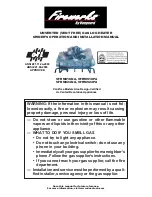
11
11
Troubleshooting
1. STOP, DANGER! Turn power “OFF” to water heater.
2. Check all wire connections to insure they are snug and
corrosion free.
3. Reset high limit switch (page 15).
4. Check for inoperative heating element (page 12).
5. Check line voltage (page 13), and internal fuses (page 14).
6. Refer to table below if items 1 through 5 above do not correct problem.
Symptom
Probable Cause
Corrective Action
Service Procedure
No Hot Water
1. No Power to Heater.
2. Blown water heater fuses.
3. Loose wire connections.
4. Inoperative heating elements.
5. Inoperative thermostat.
6. Open Hi Limit Switch.
7. Inoperative contactors.
1. Check circuit breakers at service panel.
2. Check water heater fuses.
3. Check all wire connections.
4. Check heating element(s)
5. Check thermostat operation.
6. Reset (check) Hi Limit Switch.
7. Check contactor operation.
2. III, Page 14
4. I, Page 12.
5. V, Page 16.
6. IV, Page 15.
7. VI, Page 18.
Not Enough
Hot Water or
Continuous
Operation
1. Inoperative heating element.
2. Sediment or lime buildup on element(s)
3. Thermostat set too low.
4. Inoperative thermostat.
5. Inoperative contactor(s).
6. Loose wire connection.
7. High demand period.
8. Undersized heater.
9. Very cold inlet water to heater.
10. Plumbing connections reversed.
1. Check heating element(s).
2. Clean or replace heating element(s)
3. Increase thermostat setting.
4. Check thermostat.
5. Check contactor operation.
6. Check all wire connections.
7. Reduce demand.
8. Replace with larger heater.
9. Temper water to heater.
10. Correct plumbing connections.
1. I, Page 12.
2. IX, Page 21.
4. V, Page 16.
5. VI, Page 18.
Slow Hot
Water
Recovery
1. Sediment or lime buildup on element(s).
2. Loose wire connection.
3. Inoperative thermostat.
4. Inoperative contactor(s).
5. De-rated heating element installed.
1. Clean or replace heating element(s).
2. Check all wire connections.
3. Check thermostat.
4. Check contactor operation.
5. Verify element voltage and wattage
rating.
1. IX, Page 12.
3. V, Page 16.
4. VI, Page 18.
5. See Page 8.
Over Heated
Water
1. Grounded heating element(s).
2. Thermostat set to high.
3. Inoperative thermostat.
4. Inoperative Hi Limit Switch.
1. Check heating element(s).
2. Adjust thermostat to desired setting.
3. Check thermostat.
4. Check Hi Limit Switch.
1. I, Page 12.
4. V, Page 16.
5. IV, Page 15.
Noisy (singing
or hissing)
Elements
1. Lime formation on element(s).
2. High or low line voltage.
1. Clean or replace heating element(s).
2. Verify line voltage to heater.
1. IX, Page 21.
2. II, Page 13
Noisy
Contactor
1. Low line voltage.
2. Debris between contactor plates.
3. Incorrect or defective operating coil.
4. Loose wire connection(s).
1. Verify line voltage to heater.
2. Replace contactor.
3. Replace contactor.
4. Check wire connections.
1. II, Page 13
WARNING
High voltage exposure. Use caution when making
voltagecheckstoavoidhazardtolifeorproperty.
Summary of Contents for ElectriFLEX HD CEHD 120
Page 5: ...5 5 General Controls Layout...
Page 25: ......
Page 26: ......
Page 27: ......
Page 28: ......












































